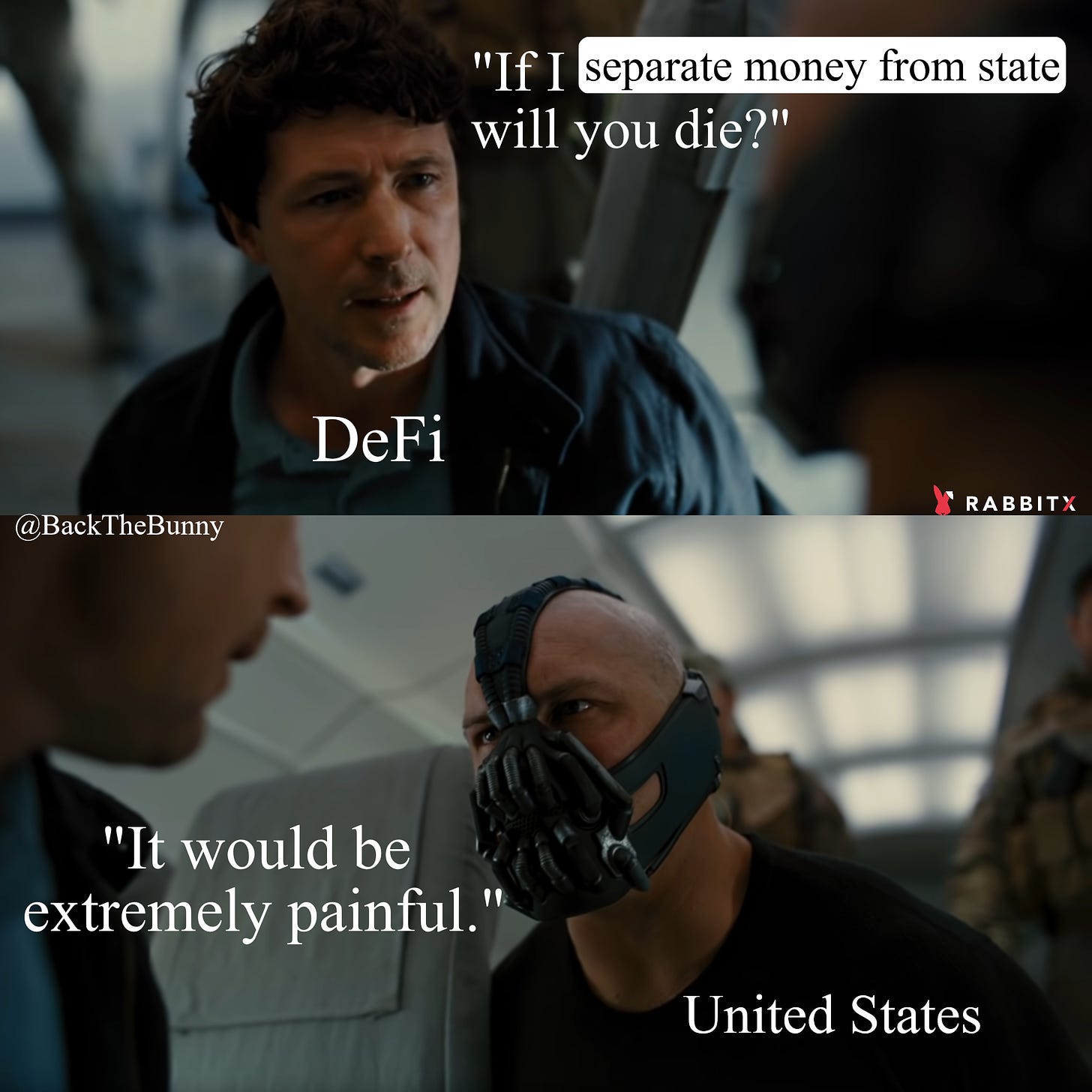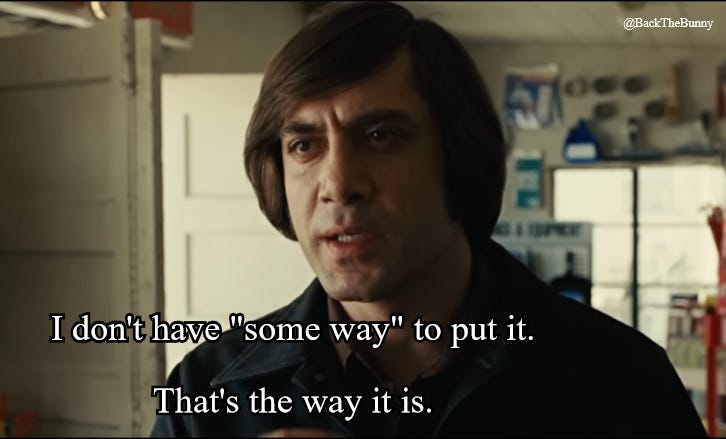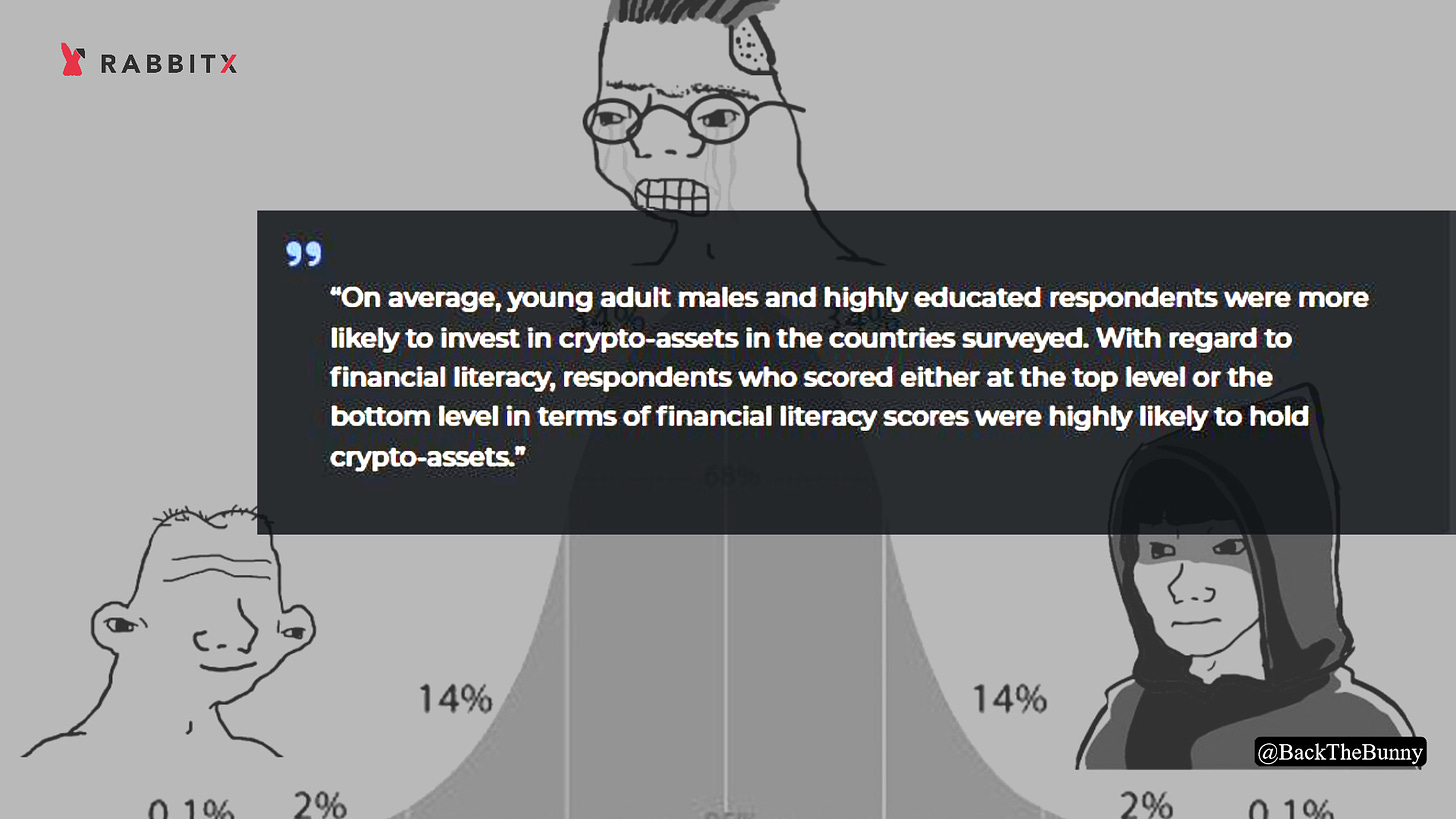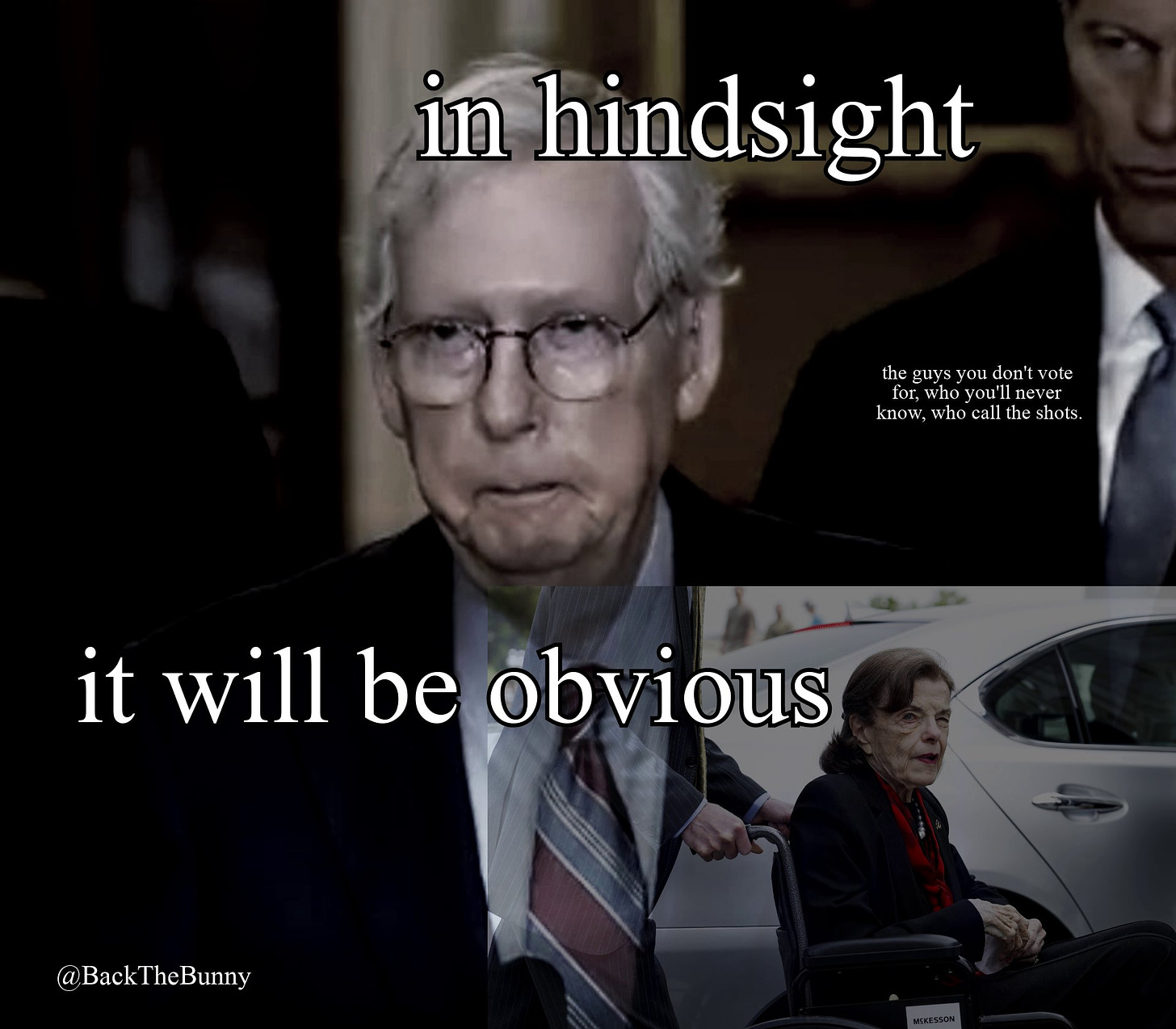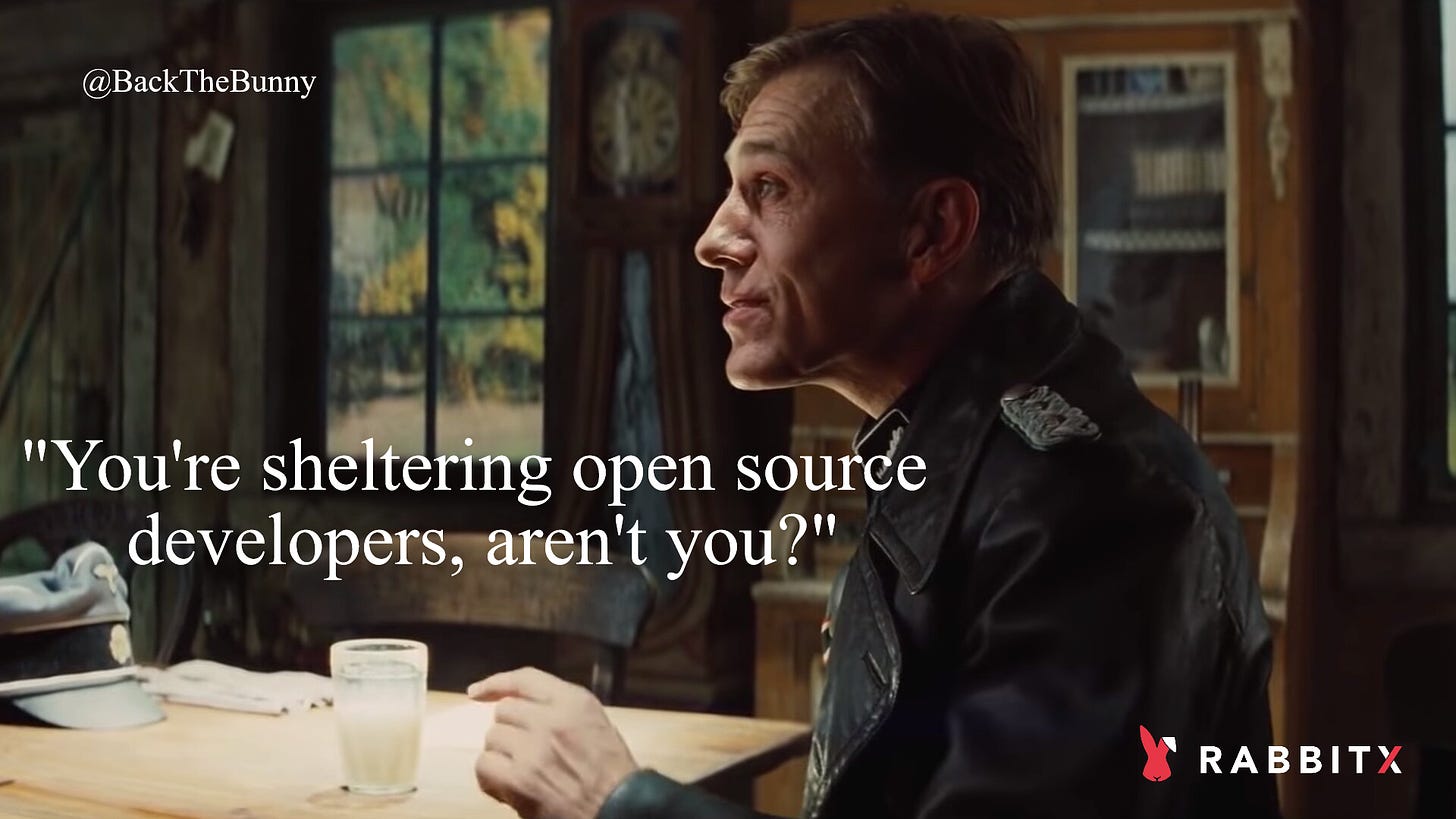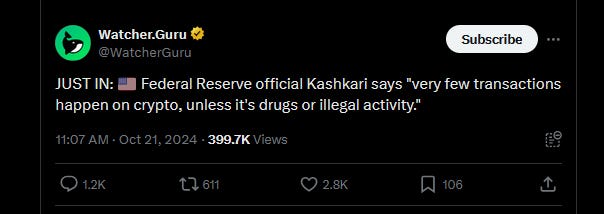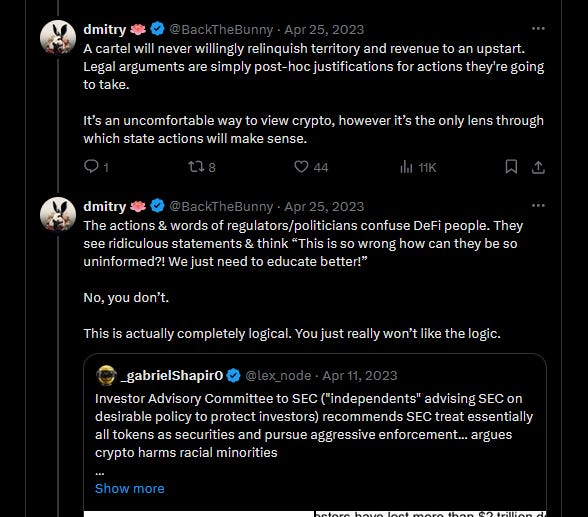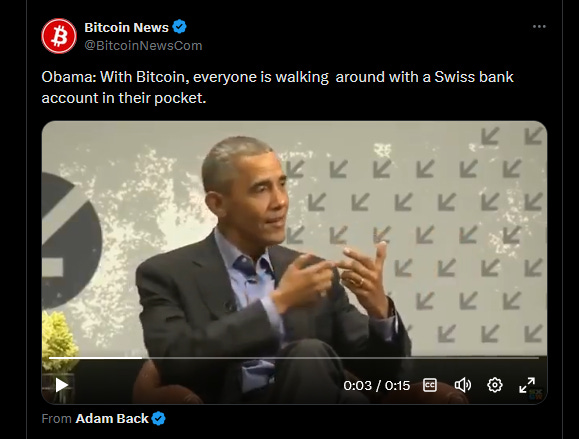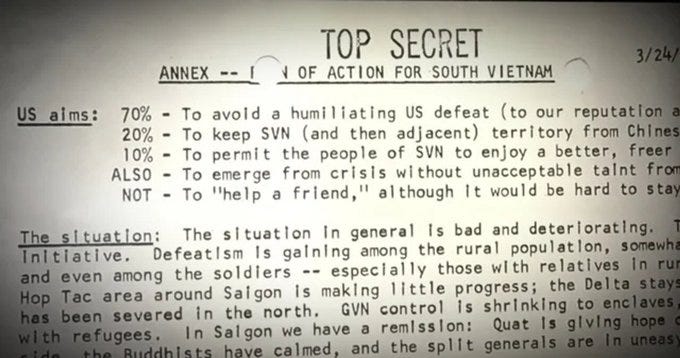The Vietnam Thesis
Crypto is a disintermediation of state control of financial infrastructure. DeFi will be attacked. It's going to get worse. But our victory is inevitable.
Economics isn't a zero-sum game, but power is.
Crypto is a disintermediation of state control of financial infrastructure. Separating money and state. This will not be taken lightly by those with much to lose.
DeFi will be attacked. It’s rational for the state to hate us. It's going to get worse. But our victory is inevitable. The Vietnam Thesis.
The US is still the world’s sole superpower. It in large part maintains its hegemony via proxy and financial wars, relying on sanctions, dollar diplomacy, and the like to impose its geopolitical will. It exerts domestic control via the banking system. The US owns the financial rails.
DeFi undermines the US’s ability to assert itself internationally and domestically by incrementally causing it to lose structural control of financial systems. In fact, it's kind of the point of DeFi. This is starting to get noticed. The response is what you'd expect. Don’t sympathize with the adversary, empathize. Imagine you were a hegemonic entity with all the soft and hard power, and an incumbent started decrementing and usurping the soft power you were accustomed to having; you’d hate us too. They are right to fear us. We are right to disintermediate them.
Permissionless, anonymous transactions in a network controlled by no single entity is antithetical to rules the US imposes on financial infra. Everything is permissioned and KYC’d. Your financial existence is a privilege. DeFi subverts it. The US doesn't like it. Naturally.
IMPORTANT:
The nature of the US-led financial system is entirely in contradistinction to what DeFi facilitates. All of it. Everything we tout DeFi for, the state hates it for the same reasons. This is irreconcilable. Power is a zero sum game. We are taking from it.
Thought experiment: what would a drug cartel do if someone started selling in its territory? Game theory, not legal theory, is your guide here.
Remember, the state:
• creates the laws
• interprets the laws
• enforces the laws
Laws made before computers should not be relied upon to protect us. When the US wants something, it does it. Irrespective of legality. Their is inter-agency disagreement on what constitutes a security, Coinbase has the legal team of God and still got a Wells Notice. Absolutely no one knows anything, and the state will do what’s in its interests. Law books will not protect us. You know who writes those books? The state. The playing field is unfair, it is what it is.
You can look to Guantanamo Bay, MK Ultra, Epstein, JFK, the Iraq War, and the litany of CIA and FBI abuses that are so commonplace we’ve stopped pretending to be outraged. There are factions within the US that are supranational and extrajudicial.
This framing is uncomfortable, but I believe it’s the correct way to understand this conflict and why we're being treated the way we are. Understanding this lets you prepare. Ignoring reality won't let us avoid it. Global empires don’t sustain themselves by asking nicely.
You should expect hostility from an entity who’s losing control as the direct result of another. You must understand someone’s motivation in order to fight them. The US’s actions will make sense this way, because you'll understand the logical motivation it has to stop us. It is rationale for the US to hate DeFi.
Historical Context and Framing
People who mock blockchains as just "distributed databases” unknowingly mock their own understanding of what crypto means for human coordination. Like reducing the internet to “something that sends emails” in the 90s. Understand how disruptive the technology that’s being built here really is.
This is why crypto can’t be understood from the normative lens of “cool innovative technology” in respect to how governments will view it. DeFi isn’t a new SaaS tool or neat way to store video files. DeFi changes financial paradigms of infrastructure, access, and its management.
The common reframe of “The US always figures it out and will get it right” is in my view historically nearsighted, parochial, and doesn’t understand crypto for what it is. For two reasons:
1. The US is a young country. It became the #1 economy around 1890. It became the preeminent superpower around 1945. What history are you referring to, exactly? It led one industrial revolution and San Francisco was an impressive phenomenon… so 78ish years? Context is needed.
There are US senators older than the time the US has been a superpower. It's been the #1 economy for ~1.6 human lifespans. You do not have the historical reference you think you do. The US seems to be right on track for a familiar 250-year cycle of empire declines.
Zoom out.
2. Crypto is the first technology that isn’t accretive to US power. In fact, it's literally designed to detract from it. The technologies that came from the previous industrial revolutions have helped the US gain economic power and benefits...
Crypto actively takes from it. I can't emphasize this enough. It fundamentally redistributes control to individuals and away from the state. Computers, telecommunications, and the internet were innovations that helped expand US influence and economic power. Blockchains directly undermine it.
This is what informs my game theoretic view that low-intensity warfare is the appropriate framework for how we will be perceived and treated. The US is best understood as a cartel when you want to understand how it will deal with DeFi. As an empire defending its hegemony.
Political Arguments and "Facts" Nobody Asked For
When you start understanding statements like "crypto is for crime, makes the outside warmer, and is racist" as political strategizing and not factual statements, they'll start to make much more sense.
US hostility isn’t happening because we need to educate politicians and help them understand what we’re building. They're attacking us because they *do* understand it. Don't take their arguments at face value. Political language doesn't have to be true, it has to be effective.
All of the post-hoc justifications they’ll use to slander DeFi are just that, a client-facing rationale for the real motivations: control and soft power. It’s political messaging to justify political actions.
It's a waste of your time to "fact check" this: nobody is lacking "facts". These are competing narratives advocating why one party should control the financial system over the other. Political statements don't have to be true, they have to be effective.
"Here are some cool facts as to why you should accept losing control of the soft power you fought wars to win!"
How much do you think the state cares about your facts here when it owns all of this infrastructure already? Does an upstart cartel put forth a well-researched argument to the dominant cartel that losing territory is in its "economic interest"?
They know what this stuff is. It is not a fact-based conversation, because you don't convince a hegemon that losing control over domestic and international financial systems is in its interests. Because, quite frankly, it isn't. They are right to fear us, and they will lie to try and stop us.
DeFi Wins, By Not Losing
On a shorter time frame, my message is bleak. But on a longer timeline, it’s completely whitepilled and sanguine. I draw inspiration from wars before us, and the success of guerillas who've fought similar battles.
Why will the US fail to stop DeFi? For the same reason it doesn't win wars anymore. The US military is built for big, centralized countries that occupy territory with formal military structure: Russia, China, Germany, etc.
Who does the US lose to? Vietnam. Afghanistan. Guerillas
Like the military, the SEC is designed to go after the same things. Built to regulate Goldman, Barclays, Deutsche.... big, slow targets that occupy office buildings with compliance departments and formal chains of command. This applies to all regulators. DeFi is built different. Regulators simply are not designed or able to keep a distributed network under their thumb. No one is.
Why can you still use The Pirate Bay? It’s here because it's nearly impossible to stop P2P networks. They're not capable of going after millions of us across the globe in a cryptographic network. The resources and competence simply are not there.
“I'm not looked in here with you, you’re locked in here with me.”
This is the energy DeFi needs. The onchain rice farmer is the ultimate guerilla. Armed with cryptography, ZK tech, AI, VPNs, well funded, with all the intellectual capital.... and you think you're going to lose?
The crypto conflict will resemble low-intensity guerilla warfare. We do not occupy territory. We do not have a centralized structure of command. We are legion. The US has historically had a very hard time with guerillas, let alone this digitized, global breed of them.
Even if militarily inferior, an indefatigable foe can outlast and win against an adversary that is not fighting for survival. It eventually will give up fighting a fundamentally un-winnable war. Just like it happened in Vietnam, it will happen again here.
We want this more than them. We're more sophisticated, robust, well-funded, and coordinated than the guerillas before us. And we have the dominant motivation: we're fighting for what we believe in. We don’t have to defeat them. We just have to not die. We are going to win.
Follow @BackTheBunny






